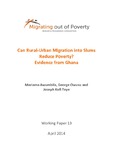Can Rural-Urban Migration into Slums Reduce Poverty? Evidence from Ghana
Date
2014-04-01Author
Awumbila, Mariama
Owusu, George
Teye, Joseph Kofi
Metadata
Show full item recordImpact
Abstract
Recent evidence indicates that the increasing levels of poverty in urban areas in Ghana are partly attributed to net migration of poor people to cities. However, evidence of the linkages between urbanisation, rural-urban migration and poverty outcome is mixed. In the light of the rapid pace of urbanisation and the resulting pressure on public facilities, policy prescription has largely occupied itself with attempts to curb rural-urban migration. There is a widely held perception – as emphasised in a number of policy documents – that ruralurban migration cannot lead to positive outcomes for migrants, their areas of origin, or destination. Recent poverty reduction strategies and urban policies tend to focus on the negative aspects of migration and little support is provided for rural-urban migrants in Ghana. Yet, the relationship between rural-urban migration and poverty reduction is not adequately understood nor explored. This study examines the livelihoods of poor migrants living and working in two urban informal settlements in Accra: Nima and Old Fadama. The findings suggest that, despite living in a harsh environment with little social protection, an overwhelming majority of the migrants believes that their overall well-being has been enhanced by migrating to Accra. Using their own ingenuity, the migrants build houses and create jobs in the informal sector and beyond in order to survive and live in Accra. The migrants are also contributing to poverty reduction and human capital development back home through remittances and investments. Yet, official assessments and perceptions of urban poverty do not take into account the fact that poor people are attracted to urban areas to utilise the multiple economic opportunities there, but instead only focus on head count measures that do not recognise these dynamics. Our findings show that urban slums are not just places of despair and misery, but places where migrants are optimistically making the most of their capabilities and are trying to move out of poverty, despite the obvious difficulties. Therefore, we urge the need for a more nuanced understanding of the connections between the migration of the poor to urban areas and the impacts that this is having on their long term prospects to exit poverty.

